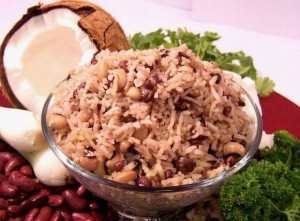Why Do Jamaicans And Caribbean Nationals Eat “Rice and Peas” On a Sunday?
“Rice and Peas” is arguably the food that is most often consumed by Jamaicans.
It complements practically all meat dishes and our Sunday dinners would not be the same without rice and peas.
The Jamaican version of this dish derived from the Akan cuisine Waakye and is made in a similar way except without millet leaves, baking soda and stews.
There is no pepper nor thyme in the Waakye version. Thyme was introduced by the British in Jamaica, and Jamaicans started using pepper in their dishes.
African slaves played an active role in the establishment of rice in the so-called “New World” and African rice was an important crop from an early period.

Rice and bean dishes were a staple dish among the peoples of West Africa, and they remained a staple among their descendants subjected to slavery.
In Jamaica, planters supplied slaves with weekly rations of salted fish and slaves agitated for the right to have and maintain small parcels of land as subsistence farms. The enslaved planted coconuts, rice, kidney beans, and gungo beans also called pigeon peas. They figured out a way to use all their crops, hence cooked rice and peas with fresh coconut milk, herbs and spices.
Why Sunday?
The ‘freed’ slaves were only granted one day from work , achieved through rigorous negotiations with owners as many owners feared that allowing their slaves to go to church could make them able to read, which in their estimation was detrimental to the plantation. The Missionaries insisted that Sundays should be a day of worship and with mounting pressures from England, along with oftentimes subtle sabotage on the plantations, the slaves were granted their request and a law was passed forbidding the slaves to work on Sundays and holidays. The act said in part….
“Article VI. We enjoin all our subjects, of whatever religion and social status they may be, to observe Sundays and the holidays that are observed by our subjects of the Roman, Catholic, and Apostolic Faith. We forbid them to work, nor make their slaves work, on said days, from midnight until the following midnight. They shall neither cultivate the earth, manufacture sugar, nor perform any other work, at the risk of a fine and an arbitrary punishment against the masters, and of confiscation by our officers of as much sugar worked by said slaves before being caught.”
The freed slaves would therefore use Sundays as the day of honor, sometimes having big gatherings after Sunday service to not only honor that day of rest, but for the preservation of the family, the socializing with neighbors and more importantly reaping the fruits of their harvest. It is from this tradition that Sunday was seen as the Family day, a day of thanksgiving where the best of everything was displayed , used and celebrated.
The dish is very nutritious. Rice is rich in starch, an excellent source of energy. Rice also has iron, vitamin B and protein. Beans also contain a good amount of iron and an even greater amount of protein than rice. Together they make up a complete protein,] which provides each of the amino acids the body cannot make for itself. Rice and beans are common and affordable ingredients, often available in difficult economic times.
By Neo Makeba
Download The Jamaican Blogs™ App for your Android device: HERE
Remember to share this article on Facebook and other Social Media Platforms. To submit your own articles or to advertise with us please send us an EMAIL at: [email protected]

